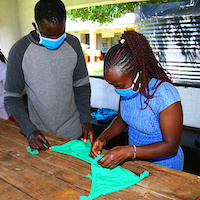Good news — but no cause for complacency
26 March 2013
The 2013 UN Human Development Report was launched a few weeks ago. A very simplified summary of its findings (though you can find the full report at http://hdr.undp.org/en/) would focus on the headline news that it identifies more than 40 countries in the developing world that have done better than had been expected in human development terms in recent decades. The report highlights the apparent resurgence of the South, led by the BRIC (Brazil, Russia, India and China) countries. But the report also notes that as well as progress there are challenges arising (some as a result of the South’s own success). Good news? Yes, of course. However, it should not imply complacency. Not all developing countries are participating fully in the rise of the South. As the report makes clear, for instance, the pace of change is slower in most of the 49 least developed countries, especially those that are landlocked or distant from world markets. Nevertheless, many of these countries have also begun to benefit from South–South trade, investment, finance and technology transfer. But the report also strongly makes the point that recent austerity policies in the North are deeply affecting both the Southern and Northern recovery towards fair and sustainable human development. We all need each other, in other words. Also, as the summary of the UN report reminds us: ‘Environmental inaction, especially regarding climate change, has the potential to halt or even reverse human development progress in the world’s poorest countries and communities. The number of people in extreme poverty could increase by up to three billion by 2050 unless environmental disasters are averted by coordinated global action.’ As a postscript to that, and, on a theme close to FOL’s heart, we all need to be aware of what growth — economic, population and industrial — can mean in terms of demand for resources, especially in the light of this year’s World Water Day — celebrated on the 22nd March. So, however, much we can — and should — celebrate a world where once deeply troubled economies are growing and enjoying many of the benefits a lot of us have long taken for granted it’s still a world where billions worry about very basic needs like the supply of safe — or any — water. When that worry is past we really will have something to celebrate.

